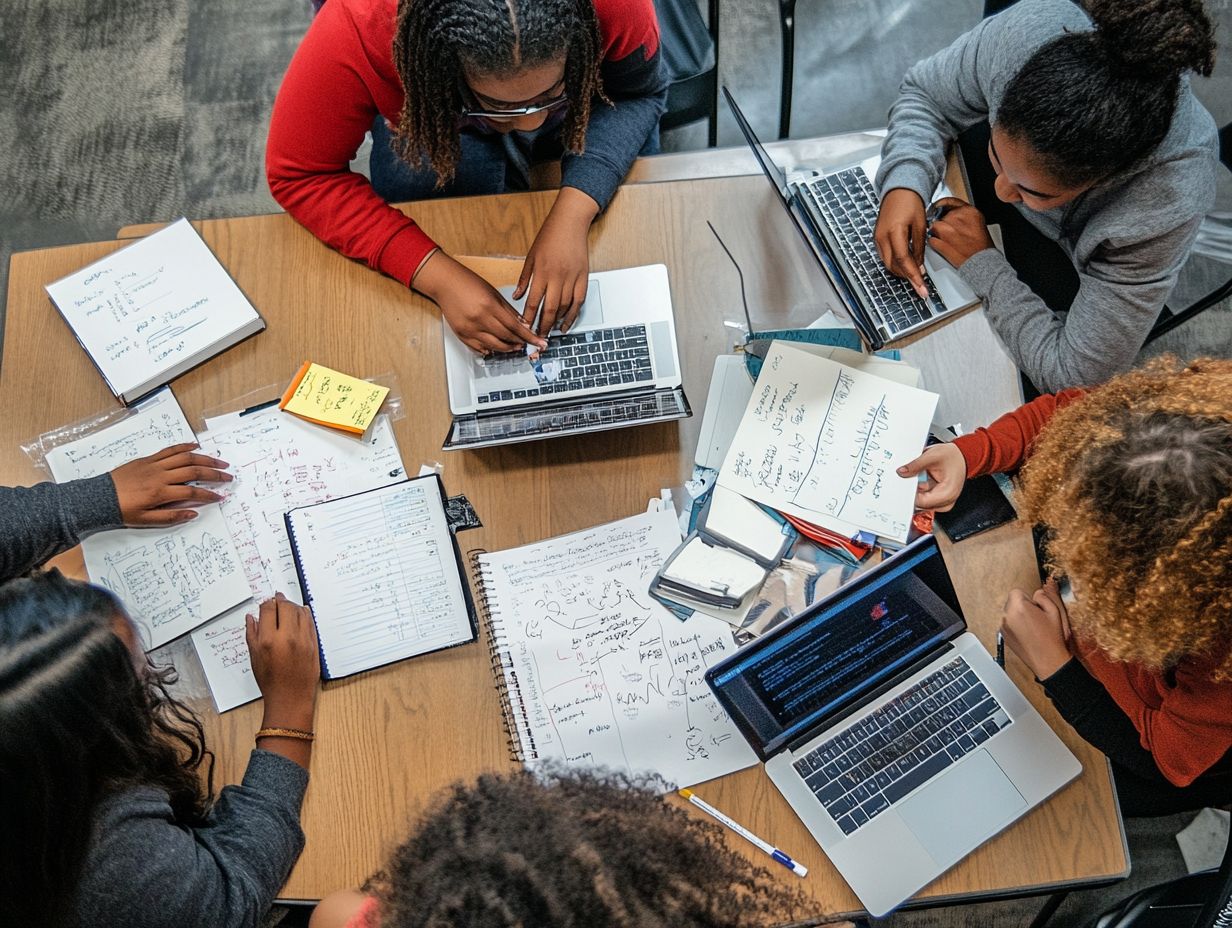the importance of review sessions before tests
Review sessions are essential for effective test preparation, providing you with an invaluable opportunity to consolidate your knowledge and enhance retention.
This article delves into the myriad benefits of review sessions, highlighting effective techniques, optimal scheduling strategies, and the pros and cons of collaborative versus individual study.
It also examines how to maximize the impact of your review time, manage test anxiety, and the benefits of using practice tests.
Elevate your study habits and tackle your next exam with unwavering confidence!
Contents
- Key Takeaways:
- The Benefits of Review Sessions
- Effective Review Techniques
- Creating a Review Schedule
- Collaborative vs Individual Review
- Maximizing the Impact of Review Sessions
- Managing Test Anxiety
- Incorporating Practice Tests into Review Sessions
- Frequently Asked Questions
- What are review sessions before tests and why are they important?
- How can review sessions help improve retention of information?
- How do review sessions help identify weak areas?
- How do review sessions help boost confidence before a test?
- When should students schedule review sessions before a test?
- Are there any alternative options for review sessions before tests?
Key Takeaways:

- Regular review sessions boost performance.
- Techniques like retrieval practice enhance retention.
- Balance group study with individual time for maximum impact.
The Benefits of Review Sessions
Review sessions are critical for elevating your understanding and engagement, especially as you gear up for key assessments like the final exam.
Typically led by teaching fellows, these sessions provide a well-structured setting where you can clarify doubts and discuss important topics together.
By utilizing a variety of educational techniques and learning aids, these review sessions cultivate a collaborative learning atmosphere, enabling you to take an active and effective role in your exam preparation.
Why Reviewing is Important for Test Preparation
Reviewing is an essential part of your test preparation, allowing you to solidify your understanding of the course materials and engage critically with key content before the exam.
This process boosts comprehension and enhances retention, enabling you to absorb information more effectively over time.
By revisiting crucial concepts, you can navigate the assessment format and exam structure with greater ease, ensuring you know exactly what to expect.
Engaging with peer questions stimulates meaningful discussions and helps clarify any doubts, while feedback from fellow students offers valuable insights into areas that may need extra focus.
Ultimately, this comprehensive approach helps you tackle your exams with confidence, armed with a deeper mastery of the material.
Effective Review Techniques
Implementing effective review techniques is essential for maximizing student engagement and enhancing problem-solving skills as you prepare for exams.
Techniques like interactive review activities, collaborative learning, and targeted teaching methods do more than just help you retain key concepts; they make learning more exciting and effective.
This approach encourages a deeper understanding of the material.
Strategies for Retaining Information
To effectively retain information, you can adopt a variety of study strategies that emphasize active learning methods. Engaging in discussions around comprehension questions in small groups and taking practice exams can significantly reinforce your understanding.
By collaborating with peers, you enhance your problem-solving skills, transforming the study process into something more interactive and, dare I say, enjoyable.
Techniques like explaining concepts to one another, creating visual aids, and participating in group brainstorming sessions can deepen your grasp of the material.
Setting up study groups allows you to share diverse perspectives, fostering a richer learning environment where everyone contributes.
Utilizing these collaborative approaches not only solidifies your knowledge but also builds essential soft skills that are crucial for teamwork in your future endeavors.
Creating a Review Schedule

Create a solid review schedule now to ensure you re fully prepared for your exams!
Establishing a well-structured review schedule is crucial for your effective learning, ensuring that you cover all necessary content areas well before your final exams.
By outlining a session agenda that breaks down topics into manageable segments, you can engage in collaborative learning through small groups.
This approach allows you to share insights and tackle complex subjects together, significantly enhancing your overall understanding.
Start your review sessions today and see the difference in your exam results!
How to Plan and Organize Review Sessions
Planning review sessions requires you to think about the best teaching strategies. Focus on ways to engage students and simplify complex topics.
To achieve this, establish clear learning objectives that will guide the session s focus and outcomes. Incorporating various educational strategies like interactive discussions and tests that help you learn along the way is essential for comprehension.
Creating an environment that encourages collaboration among students can significantly elevate the learning experience. Peer questions that stimulate dialogue will lead to a deeper understanding of the material.
Additionally, a supportive atmosphere where students feel comfortable sharing their ideas and concerns can greatly enhance the review process.
Collaborative vs Individual Review
The debate around collaborative versus individual review methods highlights important advantages and disadvantages that can impact understanding and retention.
Collaborative reviews boost active learning. You get to join discussions, share ideas, and sharpen your problem-solving skills!
On the other hand, individual review offers a personalized approach, allowing you to focus on your unique comprehension levels and preferred study strategies.
Pros and Cons of Studying with Others
Studying with others can be incredibly beneficial, promoting deeper engagement through discussions and collaborative learning strategies. However, it can also bring challenges like distractions and different focus levels.
When you come together with peers to share ideas, diverse perspectives enrich your learning experience. This often leads to heightened motivation and a deeper understanding of course objectives.
Yet, you might face issues like a lack of accountability, where some students rely too much on their peers to complete tasks. Misunderstandings can also arise when individuals interpret content differently, potentially slowing down the group’s progress.
Addressing these challenges is crucial to maximizing the benefits of collaborative learning while minimizing its pitfalls, ultimately resulting in a more effective educational experience for everyone involved.
Maximizing the Impact of Review Sessions
Maximize your review sessions by using strategies that get students involved. This will greatly improve learning outcomes!
By cultivating an engaging atmosphere, you can inspire students to participate, ask questions, and stay focused on their study objectives. Ultimately, this leads to a more effective and enriching learning experience.
Tips for Making the Most Out of Review Time

To truly maximize your review time, focus on effective time management and adopt study strategies that enhance your exam preparation.
By prioritizing key content areas, engaging in meaningful review activities, and using learning aids, you can significantly boost the effectiveness of your study sessions.
Establishing a structured study plan helps you allocate specific time slots for each subject, ensuring no topic is overlooked. Setting actionable learning goals not only aids in tracking your progress but also keeps your motivation high throughout the process.
Leveraging a mix of resources such as online tutorials, study groups, and practice assessments will deepen your understanding of different assessment formats. This approach promotes active engagement with the material, ensuring you re well-prepared for your evaluations.
Managing Test Anxiety
Managing test anxiety is essential as you approach your final exams. Strategically utilizing review sessions can significantly ease this stress.
These sessions create a structured environment where you can address your questions and reinforce your understanding. This not only helps reduce anxiety but also cultivates a more positive outlook toward your assessments.
How Review Sessions Can Help Reduce Test Anxiety
Review sessions can significantly alleviate test anxiety by creating a supportive environment that fosters engagement and enhances problem-solving abilities.
In these collaborative learning spaces, you and your peers come together to share insights and clarify concepts. This makes difficult topics clearer and builds a sense of community.
The camaraderie transforms studying into a shared experience. It encourages you to engage in meaningful peer reviews that reinforce your understanding through discussion and constructive feedback.
As you collectively navigate complex topics, the atmosphere shifts from intimidating to inviting. This allows for open dialogue and the sharing of diverse perspectives.
This relaxed approach to exam preparation ultimately creates a welcoming backdrop, helping you feel more at ease when it s time to face your assessments.
Incorporating Practice Tests into Review Sessions
Incorporating practice tests into your review sessions is a highly effective strategy for preparing students for the exam structure and assessment format they will encounter.
This approach reinforces critical concepts and simulates real test conditions, helping learners become acquainted with the types of questions they may face. This fosters greater confidence and readiness for the actual exam.
The Benefits of Simulating Test Conditions
Practicing in an environment similar to the test can significantly elevate your engagement and prepare you for the realities of assessments, effectively reducing exam anxiety.
By creating a test-like atmosphere, educators help you adapt to the pressures of formal evaluations. This also fosters the development of essential problem-solving skills.
This method, often woven into innovative teaching strategies, encourages collaboration and mutual support among peers as you tackle challenging questions together.
Engaging in discussions and group activities can deepen your understanding of the material, instilling a sense of preparedness.
Ultimately, this environment cultivates confidence, enabling you to approach both practice and real exams with a more positive and proactive mindset.
Frequently Asked Questions

What are review sessions before tests and why are they important?
Review sessions before tests are dedicated study sessions that help students review what they’ve learned before an upcoming exam. They are important because they can improve retention of information, identify weak areas, and boost confidence.
How can review sessions help improve retention of information?
Review sessions give students the opportunity to revisit and review concepts and material that they have previously learned. This repetition helps reinforce the information in their memory, making it easier to recall during the test.
How do review sessions help identify weak areas?
During review sessions, students can go over their notes, practice problems, and previous assignments. This helps them identify areas where they may be struggling and need to focus their studying.
How do review sessions help boost confidence before a test?
Review sessions allow students to build their confidence by going over material they have already covered. This can alleviate test anxiety and give students a sense of preparedness and control over the material.
When should students schedule review sessions before a test?
It is recommended to schedule review sessions at least a few days before the test to allow enough time for thorough review. It is also beneficial to have shorter review sessions leading up to the test to keep the material fresh in the student’s mind.
Are there any alternative options for review sessions before tests?
Yes, in addition to traditional review sessions with classmates or a teacher, there are also online resources and study guides available for students. These can provide additional practice and review opportunities for students who may not have access to in-person review sessions.
Start your review sessions today and conquer your test anxiety!





